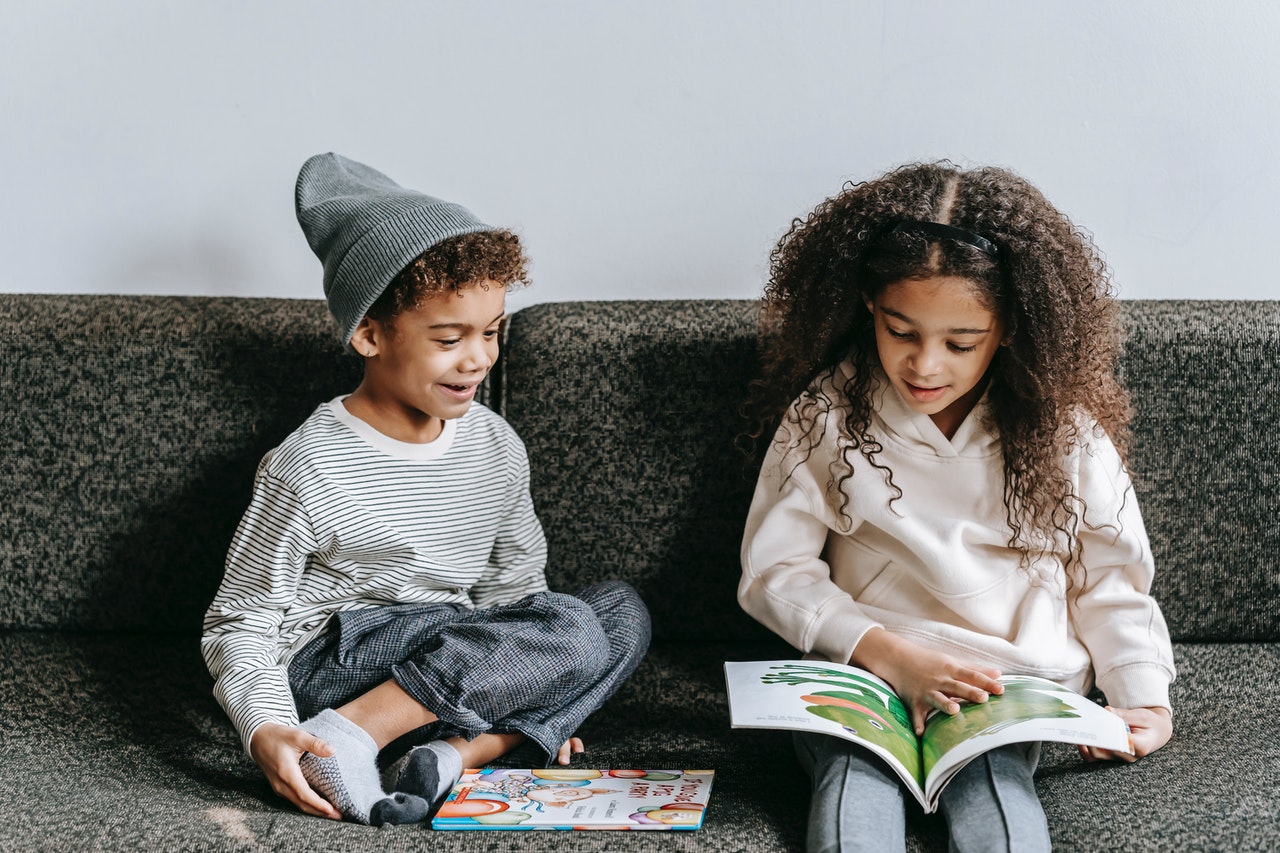Trying to figure out which books are best for 5 or 6 year olds? Fear not, because we’ve put together a recommended reading list for Year 1 students!
Year 1 is where you’ll often find your child wanting to become more independent with their reading, but it also doesn’t hurt to read aloud with them every now and then to hear them familiarise themselves with new words! Check out our FREE Year 1 Reading Comprehension Worksheets for extra practise!
Have a look at some of the texts we’ve listed and click on the links for a more detailed summary of each book! If any of them pique your interest, you can check if they’re available at your child’s school or your local library.
Our Year 1 reading list is based on books that have been recommended by NESA — you can have a look at the syllabus here!
So, let’s get started!
Picture Books
Australian Literature
English Resources
Looking for reading lists for other year groups?
If you have a child in a different year group to Year 1, we’ve also got reading list for them! Check them out:
Year 2 | Year 3 | Year 4 | Year 5 | Year 6 | Year 7 & 8 | Year 9 | Year 10
You can also check out our guide to Year 1 English right here!
On the hunt for Reading Comprehension Worksheets?
We’ve taken careful consideration in developing a series of reading comprehension worksheets suited for various year levels. The best part? We’re dedicated to continuous growth, ensuring a steady influx of fresh worksheets to enrich the learning experience.
Should your child find themselves in a different year level, worry not – our collection boasts purposefully crafted reading comprehension worksheets, each contributing to their educational path.
Delve into our comprehensive range of reading comprehension worksheets, meticulously honed for different year groups:
Year 1 | Year 2
Picture Books
| Text | Author | About |
|---|---|---|
Alfie Gets in First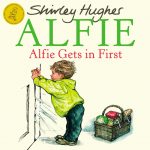 Image sourced from Penguin Books Australia | Shirley Hughes | Alfie always tries to be the first one inside after shopping, but things quickly turn scary when the door locks behind him! Now, he’s inside the house with his mother and sister locked out, so he needs to figure out a plan. |
Belinda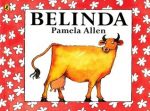 Image sourced from Goodreads | Pamela Allen | On the farm, Old Tom is always busy gardening. His wife, Bessie, milks the cow, Belinda. When Bessie goes to visit her daughter in the city, Old Tom has trouble gaining Belinda’s trust. Worried that he won’t get enough milk to take care of his animals, Old Tom finds a way to take action. |
Each Peach Pear Plum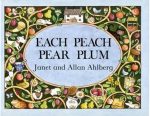 Image sourced from Goodreads | Janet Ahlberg & Allan Ahlberg | Each Peach Pear Plum is an interactive, I Spy style book that explores a new nursery rhyme character on each page. From Tom Thumb to Robin Hood, this book engages the imagination of all children. |
I'm The Best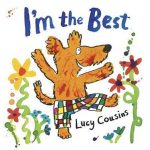 Image sourced from Booktopia | Lucy Cousins | Dog thinks he’s the best, and he loves to tell everybody. This upsets all of his friends, but they soon realise that each of them has a special skill that Dog does not share. Through this discovery, Dog must learn to appreciate the differences that everybody has. |
Mr Archimedes' Bath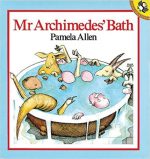 Image sourced from MathsThroughStories.org | Pamela Allen | Mr Archimedes loves bathtime, but his bath keeps overflowing! He is determined to find out who keeps adding water between his friends, Kangaroo, Goat and Wombat. This book introduces the concept of displacement to young children without using difficult language or terminology. |
Mr McGee And The Biting Flea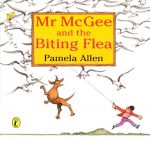 Image sourced from Penguin Books Australia | Pamela Allen | A Man called Mr McGee goes down to the beach to fly his kite, but soon he is bitten by a flea. He does everything he can to get rid of the flea. The simple rhymes and expressive images make this book perfect to read aloud. |
Otto the Book Bear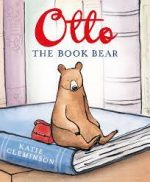 Image sourced from Penguin Books Australia | Katie Cleminson | This is the story of Otto, a bear in a book who comes to life when nobody is looking. He likes to explore the house, read and write. Otto finds himself in trouble when his book is taken away while he’s still exploring. How will he learn to be all by himself? |
Owl Babies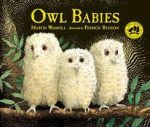 Image sourced from Penguin Random House | Martin Waddell | Three owl babies called Sarah, Percy and Bill live in a hole in a tree. They wake up one night and their mother is gone. As time passes, they start to worry about where she is. This story teaches a valuable lesson about trust and parental love that is so important to children. |
The Story About Ping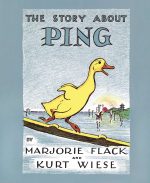 Image sourced from Penguin Books Australia | Marjorie Flack | Ping is a duckling who lives on the Yangtze River with his big family. The family has a rule: the last duckling to return to the boat gets in trouble. When Ping doesn’t hear the call to return to the boat, he decides to hide on the river bank, but then finds himself all alone. |
Australian Literature
| Text | Author | About |
|---|---|---|
April and Esme: Tooth Fairies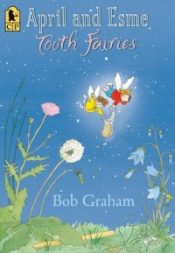 Image sourced from Penguin Random House | Bob Graham | Two young tooth fairies, April and Esme, set out to collect their first tooth. They have been waiting for this opportunity for a long time, so they need to make sure everything goes smoothly... |
Big Rain Coming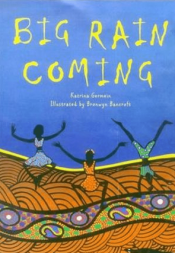 Image sourced from Indigenous.gov.au | Katrina Germein | In the Australian outback, there is a harsh drought, and everybody tries to keep cool while waiting for the rain to come. The beautiful Aboriginal artwork by Bronwyn Bancroft captures just how hard it is to wait for rain in these conditions. |
Clancy & Millie and the Very Fine House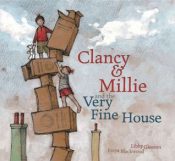 Image sourced from Goodreads | Libby Gleeson | Clancy has just moved into a new house. Both of his parents seem to love it, but Clancy isn’t so sure. It’s too big, his cubby house is gone and there’s no fireplace. Finding a friend, Clancy learns to love his new environment and feels like he belongs. |
Collecting Colour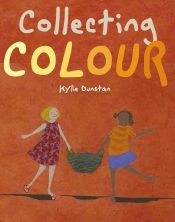 Image sourced from Hachette Australia | Kylie Dunstan | Rose and Olive live in the Northern Territory, and they explore the many uses of stringy bark and pandanus leaves. Together, they help Olive’s mother to make baskets and bags. This book is an excellent example of Aboriginal art which can be enjoyed by readers of all ethnicities. |
For All Creatures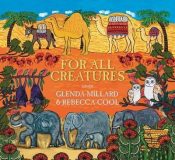 Image sourced from Readings | Glenda Millard | This Australian classic celebrates life in all its forms. From butterflies to echidnas, Glenda Millard expresses her gratitude for everything the world gives to us. |
Little Tim and the Brave Sea Captain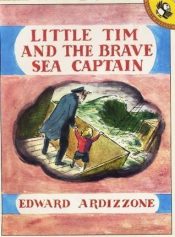 Image sourced from Goodreads | Edward Ardizzone | Tim has always wanted to become a sailor, but his parents think he is far too young. One day, he finally gets a chance to hide on a steamer, but he quickly finds out that life as a sailor is much more difficult than he thought. |
Look, a Book!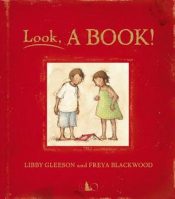 Image sourced from Goodreads | Libby Gleeson | This book focusses on the healing nature of books and the many opportunities they can provide us. Two children discover a book, and their imagination is ignited. Suddenly, their lives become enchanted by the story they experience. |
Stradbroke Dreamtime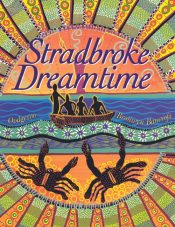 Image sourced from HarperCollins Australia | Oodgeroo Noonuccal | This Aboriginal classic picture book explores life growing up on Stradbroke Island in the area belonging to the Quandamooka people. Aboriginal mythology and illustration styles are integrated throughout the story, and it is an excellent introduction of Aboriginal culture to non-Indigenous readers. |
The Bunyip of Berkeley's Creek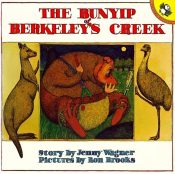 Image sourced from Penguin Books Australia | Jenny Wagner | A long-standing favourite for Australian readers, The Bunyip of Berkeley’s Creek details the issues of identity and self-esteem. Through a make-believe creature known as a Bunyip, this powerful story teaches readers that nobody’s opinion of oneself is as important as their own. |
Wombat Stew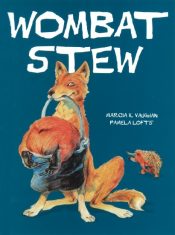 Image sourced from School Essentials | Marcia K. Vaughan | Wombat Stew is the story of a villainous Dingo who has caught a wombat. Determined to save their friend, all the other animals decide to trick Dingo into letting Wombat go. This book will introduce readers to the food chain in Australia as well as the importance of team work. |
English Resources
Reading Comprehension
Students in Year 1 will typically start developing a level of autonomy when it comes to their reading — but even if they’d like to start reading independently, it’s important that guided reading still occurs in order to improve their reading comprehension.
Guiding them as they read has several benefits — mainly allowing them to actively engage with the text.
Some steps you’ll want to take when reading include:
- Having them read aloud
- Looking for clues in the story
- Re-reading the book
- Talking about what you are reading
To learn more about tips to improve reading comprehension, check out our guide here!
Spelling
Now spelling is one of those skills that students can continuously develop through their reading as they become exposed to newer words!
As they read through different books, you might want to make a list of unfamiliar words that your child has come across and test them on the spelling.
Though if you’re on the hunt for pre-made worksheets, we’ve got plenty for you to access.
To download our Year 1 spelling words worksheets for FREE, head here!
Vocabulary
When your child reads through a number of books, they’ll be picking up a lot of new words and terminology that they may not have seen or heard before. It’s important that when this happens, your child is given a chance to actually use those words in their everyday vocabulary!
If your child isn’t too sure of the meaning of a word, it’s good to provide them with examples of the word used in the correct context. This will give them the chance to learn how to communicate effectively with others through using words appropriately.
Aside from reading, your child can develop their vocabulary through imaginative play and educational TV shows.
Check out some strategies you can implement to increase your child’s vocabulary here!
Punctuation
In Year 1, the main types of punctuation that students focus on and learn about are question marks and exclamation marks. These punctuation types are ways to indicate different forms of expression.
Download our FREE punctuation worksheets for Year 1 students here!
Looking for some extra help for your child with English?
We have an incredible team of English tutors and mentors!
We offer tutoring and mentoring for Years K-12 in a variety of subjects, with personalised lessons conducted one-on-one in your home, online or at one of our state of the art campuses in Hornsby or the Hills!
We’ve supported over 8,000 students over the last 11 years, and on average our students score mark improvements of over 20%!
To find out more and get started with an inspirational English tutor and mentor, get in touch today or give us a ring on 1300 267 888!
Alicia Hassell is a K-6 English Resource Designer at Art of Smart, currently completing her final year of a Bachelor of Education (Secondary) with teaching areas in French, English and EAL/D. Teaching is a big passion of hers, and she loves everything involving languages. In her spare time she likes to read a good book and sew her own clothes!

